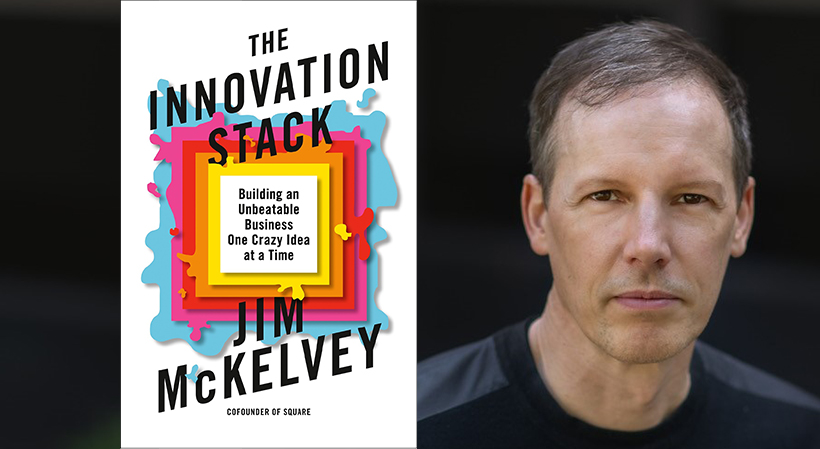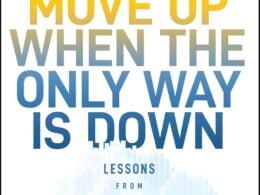When glassblower and computer scientist Jim McKelvey teamed up with Twitter co-founder Jack Dorsey to launch Square, a startup that enables small business owners to accept credit cards, payment industry insiders told them they were crazy. And when Amazon launched a product to compete with it, many predicted it would kill off Square.
But over a decade later, Square is still going strong, and Amazon discontinued its credit card reader.
McKelvey explores the reasons for this surprising turn of events in a new book called “The Innovation Stack: Building an Unbeatable Business One Crazy Idea at a Time.” He also chronicles the rise of other unexpectedly successful businesses including IKEA, Bank of Italy and Southwest Airlines.
We caught up with McKelvey to find out more.
This conversation has been edited for clarity and brevity.
StartupNation exclusive discounts and savings on Dell products and accessories: Learn more here
StartupNation: How would you explain the concept of the innovation stack?
Jim McKelvey: The innovation stack is this super powerful phenomenon that I stumbled upon, trying to explain how Square survived an attack by Amazon. For some amazing reason, we were able to not only survive, but in the end, (Amazon) turned around and mailed their soon-to-be-former Amazon register customers a Square reader. They were totally cool about the way they decommissioned their product.
I wanted to know what happened. Not just that we won, but why we won. And that set me on a two-year quest, which ended up producing this book. Square stumbled onto a process that I didn’t have a name for, so I called it the “innovation stack.” And it turns out the process has been prevalent throughout history, but it is actually rare at any one moment of time.
StartupNation: Who is the book intended for?
Jim McKelvey: It’s aimed particularly at people who have been disqualifying themselves from becoming entrepreneurs. When I say “entrepreneur,” I mean a person who tries to do something that’s never been done before.
Lots of people want to start businesses these days and we call them entrepreneurs, but I call them “business people.” Entrepreneurship is a term that is reserved for people who are doing something new.
People who attempt to do something new by definition cannot be qualified. You can only be qualified to do something that has qualification standards, which means that it’s been done before. I can be qualified to be a pilot because there are training programs, and we know how to train a pilot these days.
Orville Wright and Wilbur Wright could not be qualified to be pilots because there was no such thing as a pilot. They were literally the first pilots, and because of that, they were unqualified. I meet people who tend to disqualify themselves from doing new things because they say, “Oh, well I’m not qualified to do this new thing.” And my answer to that is that nobody in history has ever been qualified to do something new. If you’re the first one who’s going try to land that triple backflip, you’re not qualified to do it, but nobody else is, either.
I wrote the book to reach out to people and show them this power that they possess. If you look at these examples in the book, all of these people who started world-dominating companies had zero qualification in their industries. Square was started by a glassblower and a massage therapist. The biggest bank in the world was started by a produce salesman who dropped out of school sometime around age 14. The biggest furniture store in the history of the world was started by a 17-year-old kid. The pattern here is too powerful to ignore.
Related: Learn How to Fail Fast in Order to Succeed
StartupNation: The subtitle of your book talks about “building an unbeatable business one crazy idea at a time.” Is it possible to differentiate a crazy idea with potential versus one that is just plain crazy? Or is that only in hindsight?
Jim McKelvey: I have never been able to differentiate the stuff that I have done personally and have been called crazy for, except in hindsight. Sometimes I do something and it fails, and people say, “Oh, look we told you it was gonna fail.” And sometimes I do stuff and it succeeds, and then people typically don’t say anything but I remember when they told me I was an idiot.
A bunch of people told me I was an idiot to start Square. Qualified people from the patent industry called me an idiot for what they thought were good reasons. And that’s life. If you are doing something new, you will feel crazy and you will almost certainly have people tell you you’re crazy.
StartupNation: Any advice for readers that isn’t in the book?
Jim McKelvey: If you want to prepare to be an entrepreneur, the best thing that I would recommend would be to put yourself in uncomfortable situations on a regular basis. Meet with someone you don’t like, talk to a person who has different political views, try some vegetable that you used to hate or you’ve never tried before.
There are two huge benefits to that. The first is you will actually expand your world. You will find some things that you thought you didn’t like that you do like. In my case, I learned to like beets. I used to hate those things growing up, but now I love them! I don’t know when that changed, but at some point I tried a beet again and I was like, “Oh, this is great, it just needed salt.”
That’s the simple benefit, but there’s a deeper benefit from doing something you’re uncomfortable with, which is that you learn to do things while you are uncomfortable.
If you follow a path of entrepreneurship, and if you do things that have not been done before, you will absolutely feel uncomfortable.
The question is, can you keep going? Do you quit? Or do you continue? Simply being familiar with a little bit of discomfort can give you a lot more resilience.
Sign Up: Receive the StartupNation newsletter!
“The Innovation Stack” is available now wherever books are sold and can be purchased via StartupNation.com.






